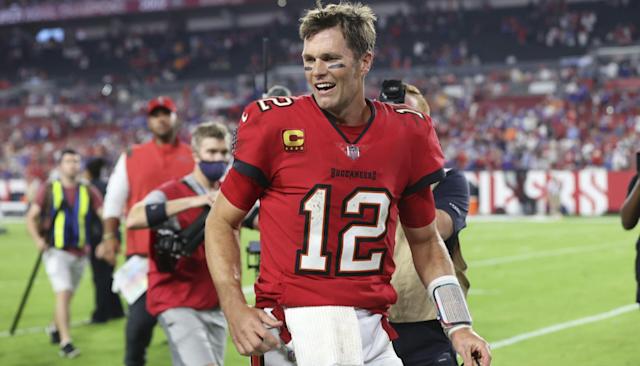By: Ryan Cooley
The regular season wrapped up Sunday and the postseason is set to begin Saturday. One topic that seems to be more controversial this season as opposed to others is the award for the most valuable player.
Here are the current betting odds for MVP via BetMGM:
Aaron Rodgers: -650
Tom Brady: +700
Joe Burrow: +2000
Rodgers is the heavy favorite to win back-to-back MVPs for this first time since Peyton Manning in 2008-2009. He has led to Packers to the first seed in the NFC with a 13-4 record, securing a first-round bye and home-field advantage throughout the playoffs. Here is a comparison between Brady’s and Rodgers’ basic statistics:
Brady:
5,316 yards
45 total touchdowns
12 interceptions
Rodgers:
4,115 yards
40 total touchdowns
4 interceptions
While Rodgers has no doubt had yet another phenomenal year, when you take a closer look between the two, it’s fairly obvious that Brady was the better/more valuable quarterback.
Interceptions
Most bring up the difference in interceptions to justify Rodgers as MVP, but let’s look deeper into this. Interceptions are labeled as a quarterback stat, but not all interceptions are created equal. Some occur from dropped passes that pop in the air, resulting in a nearby defender intercepting it. Others can be from hail marys at the end of a half or game which aren’t really on the quarterback unless it was severely underthrown.
On the other hand, some incomplete passes could easily be interceptions if the defender didn’t drop the pass. Pro Football Focus’ turnover-worthy plays take out the luck factor when it comes to bad decisions/throws. I have often seen Brady’s volume accounted for when looking at his statistics with many saying he “should” have good stats as he throws the ball on average 42 times a game. Well, this actually helps his case when it comes to recklessness.
Brady had 15 turnover-worthy plays to Rodgers 12. However, when you factor in Brady having 188 more pass attempts, he has a lower turnover-worthy play percentage (1.9% to 2%). All in all, this means when Brady drops back to throw, he is less prone to put the ball in harm’s way.
WAR
A metric from Pro Football Focus was created to determine just how valuable a player is to their team. WAR (wins above replacement), helps us grasp how many wins a player accounted for when comparing them to a replacement-level player. While many statistics should be considered when determining MVP, WAR might be the most crucial as it directly correlates to how valuable said player is.
After 18 weeks, Brady leads the league in WAR, at 4.94. This is by a large margin as Burrow is second at 4.05. Rodgers, whom many claim as the most “valuable,” has a WAR of 3.34, good for sixth in the league. While 3.34 is impressive, it is not close to how valuable Brady has been to the Bucs.
Team Success
While some view it as unfair, wins are important in the MVP discussion. Deshaun Watson put together a remarkable year in 2020. However, due to the Texans’ poor record, he was never truly an MVP candidate. While Rodgers and the Packers have the number one seed, he shares the same record with Brady and the Bucs at 13-4.
Another factor is the opponents each quarterback has faced. Brady had the 2nd most difficult strength of schedule when it comes to pass defenses faced. Rodgers had the 9th easiest.
Points scored are fairly important as you need more points than the opposing team to actually win a game. Brady and the Bucs have Rodgers and the Packers by a substantial margin in this field too. The Bucs score an average of 30.1 ppg, good for 2nd best. The Packers score an average of 26.5 ppg (10th best). This is five points less than their average from a year ago.
Conclusion
At the end of the day, the Bucs have relied on Brady to carry its offense in 2021. Not many teams who average over 42 pass attempts end up with a 13-4 record. Not many quarterbacks with that high of volume can keep up elite-level efficiency, but Brady has, as he also possesses the highest overall grade among quarterbacks (92). Rodgers grade ranks fourth (90).
I hope one day, we stop using just basic statistics to determine who wins MVP and use more advanced/valuable resources that can give us a deeper look at how well players perform throughout a season.


 NFL
NFL




